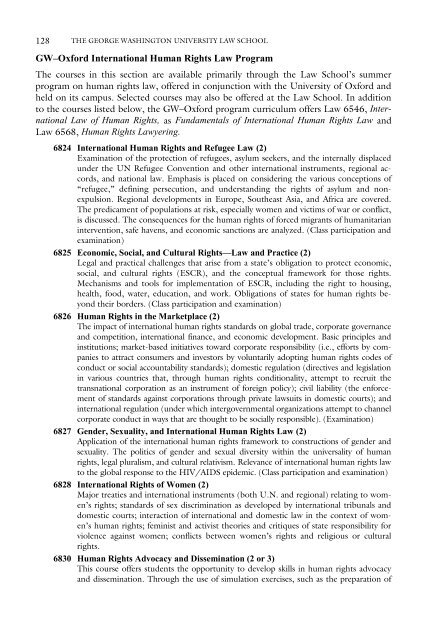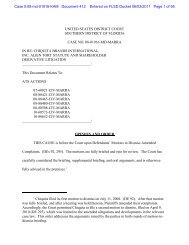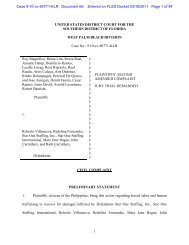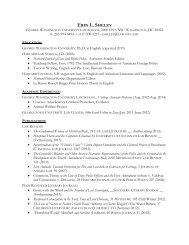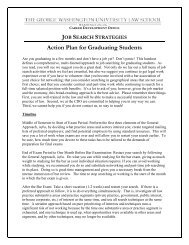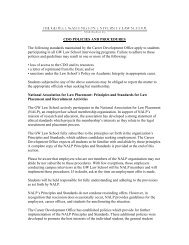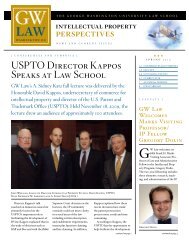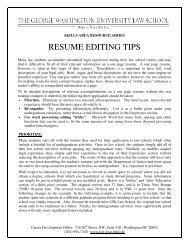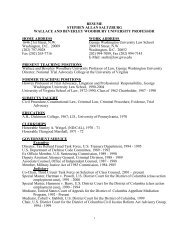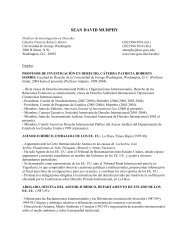The Bulletin - George Washington University Law School
The Bulletin - George Washington University Law School
The Bulletin - George Washington University Law School
- No tags were found...
Create successful ePaper yourself
Turn your PDF publications into a flip-book with our unique Google optimized e-Paper software.
128 THE GEORGE WASHINGTON UNIVERSITY LAW SCHOOLGW–Oxford International Human Rights <strong>Law</strong> Program<strong>The</strong> courses in this section are available primarily through the <strong>Law</strong> <strong>School</strong>’s summerprogram on human rights law, offered in conjunction with the <strong>University</strong> of Oxford andheld on its campus. Selected courses may also be offered at the <strong>Law</strong> <strong>School</strong>. In additionto the courses listed below, the GW–Oxford program curriculum offers <strong>Law</strong> 6546, International<strong>Law</strong> of Human Rights, as Fundamentals of International Human Rights <strong>Law</strong> and<strong>Law</strong> 6568, Human Rights <strong>Law</strong>yering.6824 International Human Rights and Refugee <strong>Law</strong> (2)Examination of the protection of refugees, asylum seekers, and the internally displacedunder the UN Refugee Convention and other international instruments, regional accords,and national law. Emphasis is placed on considering the various conceptions of“refugee,” defining persecution, and understanding the rights of asylum and nonexpulsion.Regional developments in Europe, Southeast Asia, and Africa are covered.<strong>The</strong> predicament of populations at risk, especially women and victims of war or conflict,is discussed. <strong>The</strong> consequences for the human rights of forced migrants of humanitarianintervention, safe havens, and economic sanctions are analyzed. (Class participation andexamination)6825 Economic, Social, and Cultural Rights—<strong>Law</strong> and Practice (2)Legal and practical challenges that arise from a state’s obligation to protect economic,social, and cultural rights (ESCR), and the conceptual framework for those rights.Mechanisms and tools for implementation of ESCR, including the right to housing,health, food, water, education, and work. Obligations of states for human rights beyondtheir borders. (Class participation and examination)6826 Human Rights in the Marketplace (2)<strong>The</strong> impact of international human rights standards on global trade, corporate governanceand competition, international finance, and economic development. Basic principles andinstitutions; market-based initiatives toward corporate responsibility (i.e., efforts by companiesto attract consumers and investors by voluntarily adopting human rights codes ofconduct or social accountability standards); domestic regulation (directives and legislationin various countries that, through human rights conditionality, attempt to recruit thetransnational corporation as an instrument of foreign policy); civil liability (the enforcementof standards against corporations through private lawsuits in domestic courts); andinternational regulation (under which intergovernmental organizations attempt to channelcorporate conduct in ways that are thought to be socially responsible). (Examination)6827 Gender, Sexuality, and International Human Rights <strong>Law</strong> (2)Application of the international human rights framework to constructions of gender andsexuality. <strong>The</strong> politics of gender and sexual diversity within the universality of humanrights, legal pluralism, and cultural relativism. Relevance of international human rights lawto the global response to the HIV/AIDS epidemic. (Class participation and examination)6828 International Rights of Women (2)Major treaties and international instruments (both U.N. and regional) relating to women’srights; standards of sex discrimination as developed by international tribunals anddomestic courts; interaction of international and domestic law in the context of women’shuman rights; feminist and activist theories and critiques of state responsibility forviolence against women; conflicts between women’s rights and religious or culturalrights.6830 Human Rights Advocacy and Dissemination (2 or 3)This course offers students the opportunity to develop skills in human rights advocacyand dissemination. Through the use of simulation exercises, such as the preparation of


